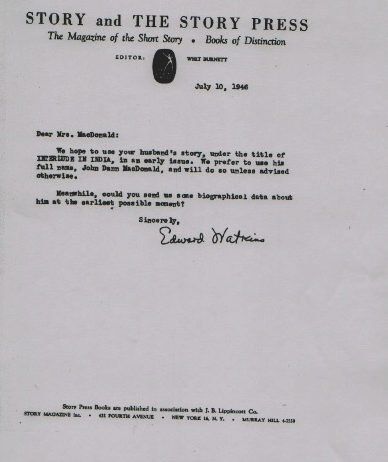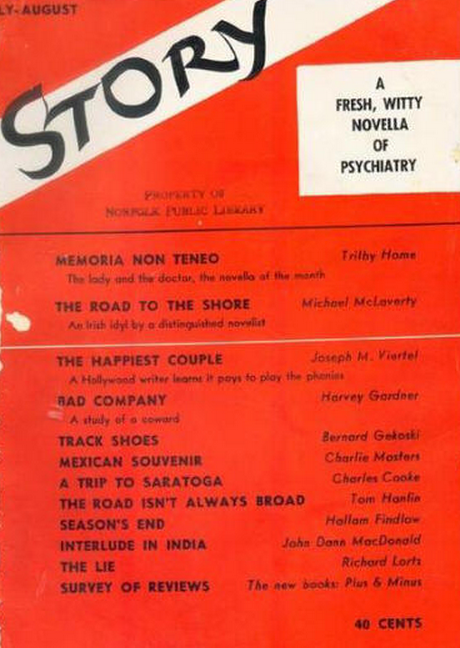

JDM’s first story was published without his knowledge. Due to heavy censorship of letters home during WWII he tired of writing the usual stuff, and sent the above story to Dorothy, his wife , in February 1944.She submitted it Esquire Magazine, which turned it down, and then to Story Magazine, where it was accepted. When JDM disembarked from his India-Burma tour of duty in late 1945, where he was in the OSS as a quartermaster, he was met by Dorothy, son Maynard, and a check for $25.00.
*****
THE RUMOR OF THE LAST MCGEE NOVEL
From time to time readers will inquire as to the truth of the rumor that JDM
wrote a black McGee, to be published after the writer's death.
It makes for fascinating stories and theories and they do abound.
However, there is no truth involved. Both his widow, Dorothy, and his son,
Maynard, stated categorically that "There is no book or manuscript by John
which ends in Travis McGee's death."
We think John would have missed him as you would."
JDM himself said this many times. On one such occasion he replied:
"It would be really wicked so to do because of the people who haven't yet met
the gentleman."
"That would be a poor legacy to leave them."
HOWEVER: In a letter to Mickey Spillane, dated Nov. 13, 1984, it is clear that JDM was at least planning another McGee. We have not yet found any notes he may have left about that next McGee. Here is a portion of that letter:
and further, in The Red Hot Typewriter it is noted on Page. 213 that in an interview with Peter J. Heck JDM said this:
“I’m gonna end [with] the twenty-second book. I got it blocked out enough to know that if the book goes all right, which I trust it will, he’s gonna pull up stakes with a bunch of about five or six other boats, good friends and what not and acquaintances. well, he’s gonna go find find the place and then go back to Bahia Mar and they’re gonna load up and take off and move to a new marina up in the Panhandle. Up there you can find areas that are as pleasant as Fort Lauderdale was twenty years ago.
Cal’s note: use of the word “gonna” is very un-JDM-like.
*********THE LEGACY
Fans of JDM ,who have long clamored for someone to continue the novels, have made their wishes known along with plenty of suggested authors to take on the task. However, the Estate has not allowed this to happen, but there has not been any good reason given publicly for that position.
Until now, that is. The statement below by JDM’s son, Maynard, came to light first a few years ago when he responded to a request by someone who wanted permission to write a sequel. Maynard copied me with his answer since many such requests happen as a result of my JDM web site which I have maintained on the internet for 17 years.
I was very impressed by the logic of the denial, and by the empathy shown to the person making the request. (While that part is not included below Maynard made it clear that the person might want to write his own story, and not use someone else’s characters.)
This is Maynard’s statement:
THE LEGACY
Within a week of my father's death in 1986, the question of sequels to his Travis McGee series was raised. It became a hot issue for many years, and even now, 26 years later, it still provokes spirited, and sometimes contentious, discussion
Early on, before I even began to come to terms with the ethics of having someone else try to step into my father's shoes, the commercial implications were an immediate issue.
A sequel would obviously affect the ongoing value of that literary property for our family.
Ok, it could also enhance the value. But if the sequel bombed, it would turn off potential fans as well as outraging the old ones, thus killing the goose that might continue to lay a modest number of golden eggs for the publishers and ourselves.
It took me a long time to get clear about the idea of sequels. And while I was slowly finding that clarity manuscripts, book proposals, and copies of books by recommended authors, rolled in. For some of the writers who loved my father's work, doing a sequel was pure fun; for a few others it was pure piracy.
Many years ago, at the 1990 John D. MacDonald Conference in Ft. Lauderdale, I was approached by a very large man who lived on a houseboat, and who claimed to have written the ultimate sequel about McGee's hitherto unknown son Trevor, who takes up where his dad left off.
This author's negotiating technique consisted of regrets that we might end up facing each other in court if I resisted the publication of his sequel. His approach remained confrontational. He later claimed that any effort by us to stop him could only benefit his book with more publicity.
Eventually, I think someone from the legal department at Random House sat on him and he backed away. He has become a legend in my family, as ever since meeting him, we refer to any one using his approach as negotiating from a position of cranial-rectal misadventure.
In contrast, a wonderful sequel prospect came from my dad's great friend, Stephen King. He wanted to do something with a black theme that would be the final McGee. Obviously, a sequel by him would have been tremendously successful commercially, and it would have been a personal tribute to my father rather than a knock-off. It was an extremely difficult choice for me. I wish the idea had come up while my dad was still alive because it would have been sensational to publish a back-to-back book with each of them imitating the other.
As you can see, the offers to extend my father's work have run from a tacky, blatant, commercial knock-off to a respectful, professional postscript to his work by a true friend. And between those extremes there have been many well-crafted manuscripts that were done with warm regard and sincere admiration for my old man.
As these offers and manuscripts continued, and the enthusiasm from Random House snowballed, I was forced to finally define and face my own personal resistance to the idea of a sequel.
Given that I am not immune to the money, why refuse?
It is because I have never seen a really good imitation, be it art, literature, or music, that carries that poignant echo of the original artist- as a man. Even if the work itself is excellent, there is an inevitable flatness on that most intimate level, the level where the artist reveals himself.
To me, a work of art is a souvenir of the artist.
It is a reflection of his inner and outer experience.
It represents who he is and where he has got to at that moment of his life.
In this sense, the creative process defies copying.
I enjoy my father's work immensely. Part of him is still there, present on each page. Trying to echo that by imitating it is like trying to paint like Van Gogh by cutting off an ear.
It also strikes me as a question of fairness. The dead cannot answer back and I feel it is presumptuous and disrespectful to play with their work.
My stand in this matter may have disappointed many of John D. MacDonald's fans, and I apologize for that.
Maynard MacDonald
©2012